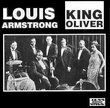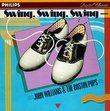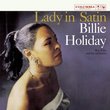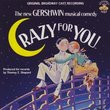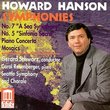| All Artists: Johannes Brahms, Marin Alsop, London Philharmonic Orchestra Title: Brahms: Symphony No. 1; Academic Festival Overture; Tragic Overture Members Wishing: 0 Total Copies: 0 Label: Naxos Release Date: 2/22/2005 Genre: Classical Style: Symphonies Number of Discs: 1 SwapaCD Credits: 1 UPC: 747313242825 |
Search - Johannes Brahms, Marin Alsop, London Philharmonic Orchestra :: Brahms: Symphony No. 1; Academic Festival Overture; Tragic Overture
 | Johannes Brahms, Marin Alsop, London Philharmonic Orchestra Brahms: Symphony No. 1; Academic Festival Overture; Tragic Overture Genre: Classical
Naxos is obviously excited about this recording, publicizing it widely and issuing it in three different formats (this plain CD, as well as SACD and DVD Audio). You can understand the excitement immediately, as the Symphon... more » |
Larger Image |
CD DetailsSynopsis
Amazon.com Naxos is obviously excited about this recording, publicizing it widely and issuing it in three different formats (this plain CD, as well as SACD and DVD Audio). You can understand the excitement immediately, as the Symphony opens with tremendous power, fortified by uncommon energy in the kettledrums, signifying that there's going to be no routine playing here. But Alsop is not all aggression; her Andante sostenuto is very tender and affecting. Detail work is just wonderful--listen, for example, to the gorgeous flute solo in the fourth movement introduction--and Brahms's syncopations, always a major aspect of his style, get their full due in this rhythmically alert performance. Both Overtures are vividly characterized, and the Academic Festival retains its humor more than usual. At this point there are so many Brahms recordings that no single one is going to satisfy all of our needs, but this recording is competitive with the best in artistic and sonic aspects. In price, it mops the floor with the competition. --Leslie Gerber Similar CDs
Similarly Requested CDs
|
CD ReviewsMarin Alsop Begins Her Brahms Series J Scott Morrison | Middlebury VT, USA | 02/22/2005 (5 out of 5 stars) "Marin Alsop, who is surely a rising star among American conductors, has made a lot of recordings in recent years, but they are mostly of American music and slightly outside the core repertoire--Rouse, Bernstein, Barber, Torke, Edgar Meyer and Mark O'Connor, Libby Larsen, Joan Tower, Edward Joseph Collins and with her own Concordia Orchestra, the music of stride-master James P. Johnson. Now apparently she's thought to be good enough by her main record label, Naxos, to begin recording things in the center of the classical music repertoire--the Brahms symphonies and overtures. This CD is the first in that series. And she is given one of the world's great orchestras to record with, the London Philharmonic. The question, of course, is how will she do in these hugely over-recorded works? On the basis of this first disc I'd have to say that she will be able to hold her own with the big boys. Her effort here is abetted by absolutely exquisite playing by the LPO. The Brahms First is the favorite of many people (not me, no doubt a personal idiosyncrasy) and thus is a tough one to start the series with (aside from that being chronologically appropriate). This is, by and large, a mainstream reading. Tempi, with one small exception, are well-judged. Balances are superb. Phrasing is sensitive, transitions, with the same exception, are smooth and natural-sounding. The LPO play like angels. How does Alsop's conception compare with other conductors' versions. Well, much to my surprise the performance this most reminds me of is my own personal favorite of all the Brahms Firsts that I know, that of Kurt Sanderling conducting the Dresden Staatskapelle, recorded in 1971. Perhaps there is less cholesterol in the string playing than in the wonderful Walter/Columbia Symphony recording, but the LPO strings are actually somewhat lusher than those in the Sanderling. There are many other wonderful performances, of course, including Haitink/Concertgebouw, Furtwngler/VPO, Karajan/BPO, and many others. But this one can stand with them. My only quibble, alluded to above, is the handling of the crucial tempo change in Movement IV at the statement of the Big Tune. The score calls for an Allegro non troppo ma con brio tempo for the initial statement of that theme, but Alsop takes an Andante con not much moto at the beginning (and it DOES sound lush and beautiful, I'll give it that) but the lead up to the animato section at mm. 94 and following, seems to rush awkwardly to get up to the tempo she wants for the animato. That aside, though, this is a lovely reading and one that easily deserves a recommendation. Add to that good performances of both the Tragic and Academic Festival Overtures, and you have a winner. Naxos helps us out with their budget pricing. How can you lose? TT=72:42 Scott Morrison" An average performance quite distant from greatness Larry VanDeSande | Mason, Michigan United States | 09/12/2005 (3 out of 5 stars) "Marin Alsop is now probably the most-recorded woman conductor ever, having churned out regular CDs and having had her photo appear on the cover of most high circulation classical music magazines. For all the buzz about her, she demonstrates no individual trait that separates her from the crowd other than being the most well known female conductor in a man's profession. Here she is equipped with one of the world's 10 best orchestras and takes on repertoire that puts her in direct competition with every conductor in history including the great, near great and mediocre conductors of the recording era. Based on the evidence presented on this CD, I do not believe she is up to that task. Her performance of the Symphony No. 1 starts well with timpani supporting the downstrokes in the opening theme, making a clear statement about the serious message to come. However, things soon go awry as a too big timpani stroke clouds the picture during a bad changeover to the exposition. Alsop next uses an ineffective contrivance that she repeats throughout this recording. She takes the quieter music much more slowly than the louder music, as if to say quiet equals slow and loud equals fast. She does this over and over throuhgout the symphony. While this can enhance the music when handled like light and shade, Alsop's approach is more like black and white. It lacks subtlety and leads to more of a stop and go approach. Instead of enhancing the experience, it gets in the way. For me, this constant tinkering with pulse and motion is an annoyance. Alsop fruitlessly takes the exposition repeat in the first movement, saying nothing more than, "Here is the music again." While composers add repeats to elongate their music and follow structural design, recreators are required to interpret repeats differently, to say something different with the same music when doing it a second time. Alsop does nothing more than repeat the music at the same speed and with the same accents. What's the point? In addition, the playing of the London Philharmonic is not uniformly the best I've heard from that group during the dramatic first movement. There is little that is excellent in the second movement, as the wonderful clarinet interplay is -- like the rest of this performance -- good but not great. The violin and horn solos and duo are better at the end, although the violin is probably too meaty for this gentle music. Alsop overinterprets the second movement "Andante Sostenuto", which translates to "at a sustained walking pace." Like most conductors, she takes the second movement as an adagio. The marking is more akin to what goes on at the beginning of the third movement, where Alsop leads an inspired reading and does her best work in the symphony. The dramatic closing movement begins without ornaments from the strings, a mistake in my opinion. The following pizzicato is almost silent, a contrast in keeping with Alsop's differential speeds in the opening movement. There is frankly too much contrast here for the whole to be effective. In addition, there is more poor playing as the timpani doesn't quite match the orchestral downstrokes as it did in the first movement. Alsop again fidgets with tempo in the quieter sections of the closing movement, then doesn't slow down for the descending scales at about 11 minutes, where a slower tempo would indeed be effective. She hustles right through this section as she does all the louder moments. A nice finish is not enough to save this performance from all its prior shortcomings. The "Tragic" overture that follows has all the fingerprints of her work in the symphony. Alsop leads a highly nuanced and extremely well played version of the "Academic Festival" overture to close the CD. So this CD begins and ends well but, unfortunately, the 60 minutes in between is not performed at such a high level. Even with modern DDD recording at Naxos's very inexpensive price, this is not an essential purchase for anyone other than fans of the conductor. You can pay about the same money on this Web site and get much better performances by Walter and Karajan (to name only two) that will give more lasting pleasure over a long term. My favorite recording of this music continues to be the 1962 recording by Karel Ancerl and the Czech Philharmonic Orchestra, last seen linked to a bad mono performance of Beethoven's Symphony No. 1. I highly recommend that performance to anyone that wants to hear a dramatic realization of the Brahms Symphony No. 1." Brahms gets time and space to unfold charles morgan, music fanatic | 02/25/2005 (5 out of 5 stars) "Well, you might be wondering, what can a new Brahms Symphony possibly bring to the table? What else is there to say that hasn't been said? Is this CD special or just a waste of time for the listener and the publisher?
The answer is that this CD is indeed special. In fact, I might be right in saying it's the best First Symphony in all-digital sound, and has truly top-rank overture performances for filler. Marin Alsop and the London Philharmonic are excellent; the playing throughout is extraordinary with exceptionally beautiful solo parts, the tempi are almost always well-judged (see below, though) and when they are unusually slow they are justified. The slightly slower takes on some sections bring out the lyrical beauty of the piece, making this CD more accessible and listenable than the hard anger of some other interpretations. Marin's interview at www.naxos.com/marin/brahms-symphonies sums up her view of the works: "Brahms needs time and space to unfold, but cannot be stretched out of proportion." Actually, that's about the only interesting comment in an otherwise somewhat shallow interview (although she mentions making another "standard cycle" - Beethoven perhaps?). Upon the statement of the Big Theme in the finale the speed is quite slow and it just doesn't work (J Scott Morrison's review below talks about this; I wouldn't have, though, because this minor annoyance won't ruin the CD for you! Fair warning, I guess). But otherwise it is a shining, excellent First Symphony full of beautiful playing and more reflective and lyrical than most. The Tragic and Academic Festival Overtures are also very good, terrific actually, and the latter is very exciting and fun. Sound quality is superb, fortunately (this is always a fear of mine with Naxos discs, but the new ones are far better than those from, say, the early 1990s). In fact, the first time I listened to the CD I played it on my Sony "Discman", whose headphones are broken so that sound comes out only one earpiece. It sounded so tremendous then that I was afraid to listen with both sides working - let alone in my car stereo or something. But I survived, and was mighty impressed by the front-row-seat sonics. Oh, and by the way, I oughta mention the fact that this CD is ridiculously cheap and a really good bargain, because no review of a Naxos CD is complete without the phrase "really good bargain." If you're unconvinced, even after reading the two reviews here, go to Naxos.com, sign up for free to listen to 25% of each track from their CDs, and listen to the samples from this disc. You will be convinced." |

 Track Listings (6) - Disc #1
Track Listings (6) - Disc #1
